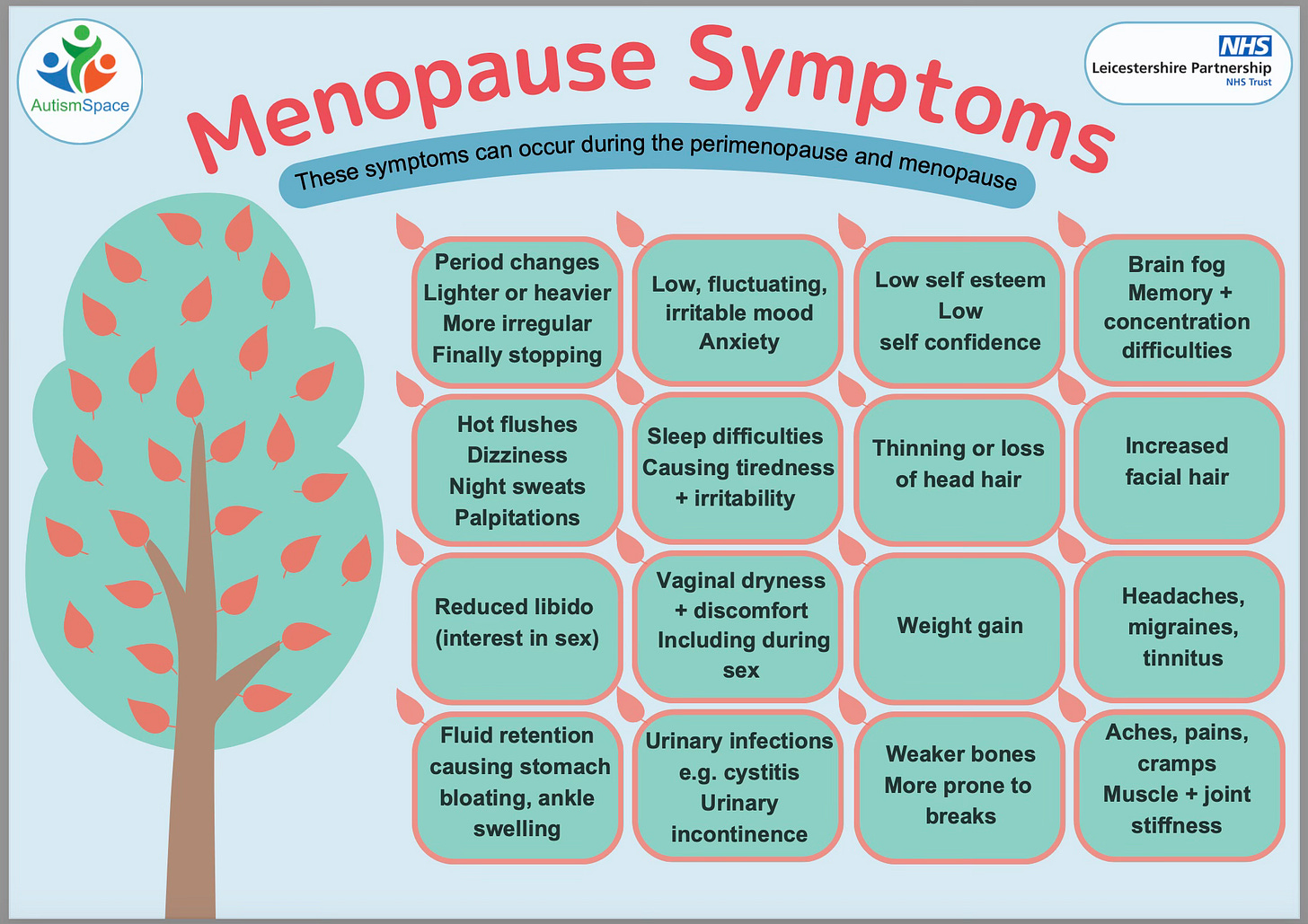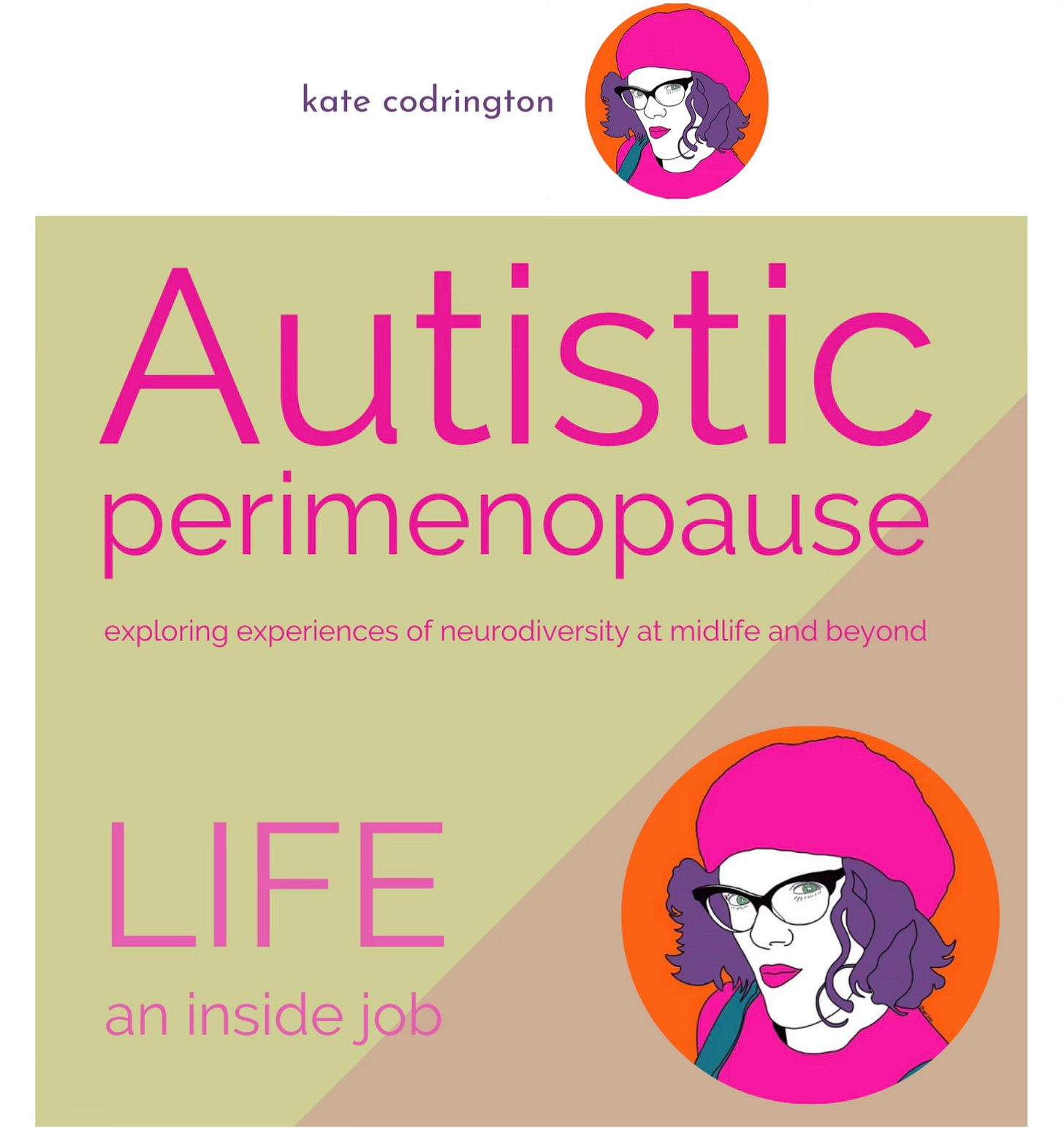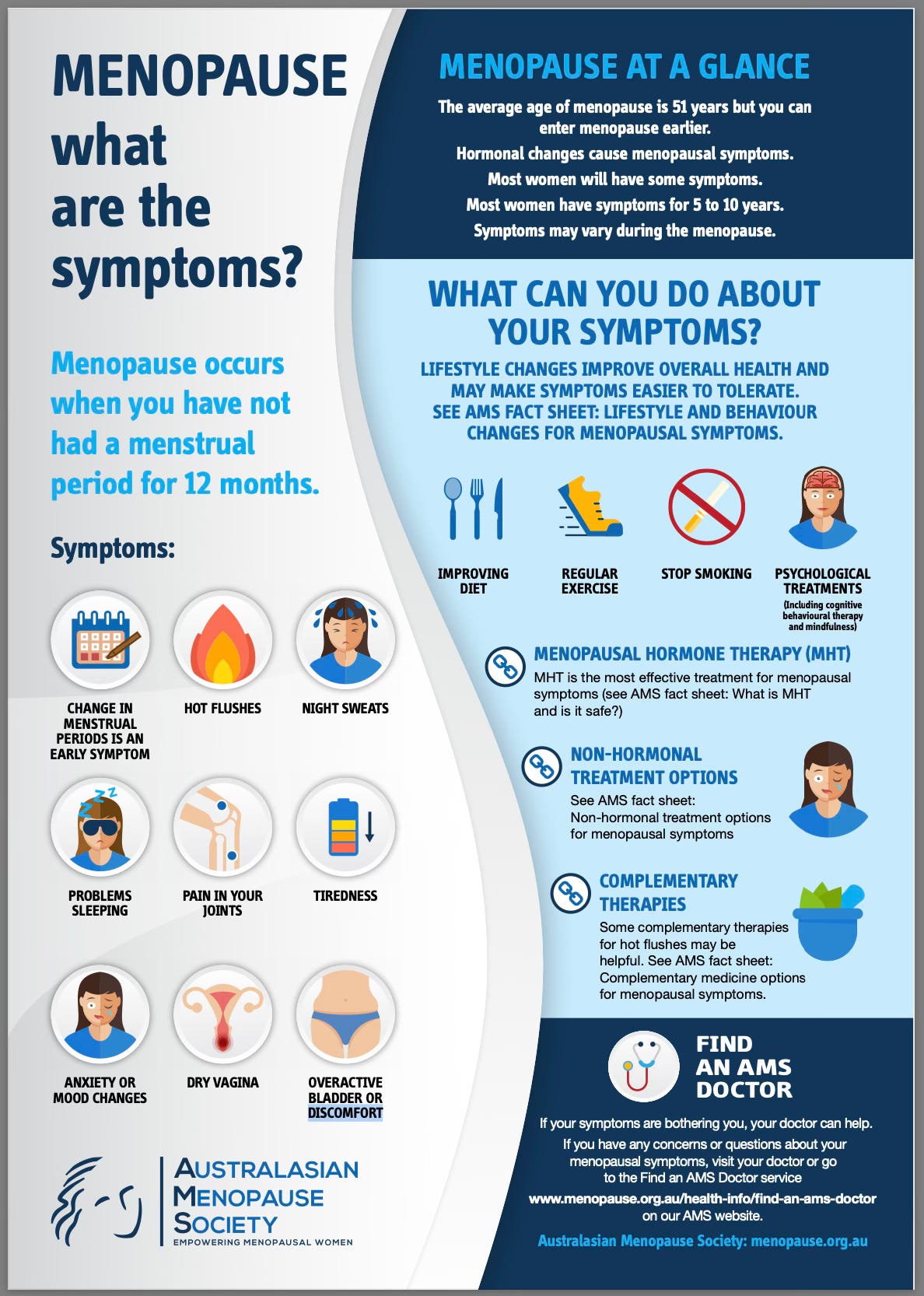Resource Roundup: Everything about Autistic Perimenopause in one place
What have I missed? Please add links in the comments so we can all stay up to date!
Autistic perimenopause is becoming increasingly well known, so let’s keep the momentum going.
I have many go to resources and podcast links to share in this evergreen post, and will keep updating it regularly.
Infodumping is my love language, so please indulge me! 🎉
This is an updated post that was originally titled ‘Happy World (Autistic) Menopause Day 2024!’
I first shared it on 18th October 2024 which marked International World Menopause Day, viewing the menopause information available online through my autistic lens.
Please add links in the comments to anything I have missed, so we can build this resource together for our community! 💕
The National Autistic Society in the UK has just released this Autism and Menopause guide (October 2024) which offers introductory level information. They have also updated their website’s Menopause page:
The menopause can bring challenges whether or not you are autistic. There is little research about autistic experiences of the menopause, but being informed about ways it might interact with your autistic traits can help you to advocate more effectively and have more compassion for yourself.
The NHS 'Menopause and Autism' webpage has some great video, infographic and literature on the autistic experience of the menopausal transition. Included are excellent links to external websites for non-autism specific resources regarding tracking and recording symptoms, health information etc.
It doesn’t get much more comprehensive than the Autistica webinar on Autism and menopause:
Menopause can be a time of changes and challenges. Emerging research suggests that autistic people may find it especially difficult. Very little is known, however, about ways that menopause might differ for autistic and non-autistic people, why some individuals might have a harder time than others, and what can be done to help them through.
In this webinar, we will explore the state of current knowledge around autistic experiences of menopause, as well as the gaps where we need to know more. The webinar will include several short talks with plenty of time for questions and discussion, where we hope to learn from our listeners their thoughts and ideas around research priorities and strategies for managing menopause.
Professor Rebecca Charlton of Goldsmiths University of London will introduce the topic of menopause with a short overview of this life stage.
Professor Julie Gamble-Turner and Dr Rachel Moseley of Bournemouth University will discuss why autistic people might struggle with menopause, as well as their research on the menopause experiences of autistic adults.
Dr Richard de Visser of the University of Sussex will discuss his research and the results of an ongoing study which situates menopausal experiences within the broader challenges autistic people face with reproductive health.
I had the honour of meeting author, podcaster and Meno-guru Kate Codrington in the UK during my recent flying visit, and picked up several signed copies of her fantastic book, Second Spring: the self-care guide to menopause.
You’re not going mad, you’re becoming sane
Perimenopause can sometimes feel like the rug has been pulled from under our feet and this can leave us feeling disempowered and lost. Second Spring is a new kind of menopause book, bringing the radical notion that with small changes and a clear-eyed look at what’s no longer serving you, you can reclaim your vitality and joy in life.
Second Spring offers a new vision for menopause, mapping the psychological phases and showing how this period in your life can be a time of personal growth. Like your slightly sweary best friend, I guide you through managing physical challenges with lifestyle changes and understanding what might be causing them. Whether you choose a natural route, HRT or a combination of both, there’s a wealth of self-care practices available here to soothe your symptoms. These include journaling prompts, practical tips, soulful enquiries and real-life solutions for managing symptoms with kindness, helping you to become the person you always longed to be.
Kate’s second book, The Perimenopause Journal: Unlock Your Power, Own Your Wellbeing, Find Your Path promises to also be excellent!
Whilst Kate’s books are not autism-specific, they lend themselves to supporting a neuro-affirming approach to perimenopause.
The podcast episode featured above is a great discussion on autistic perimenopause, with Kate being probably the first person I heard giving this important topic any airtime! 💪
The episode shownotes (with great links and resources definitely worth following up on) from this fantastic podcast episode are here. Kate also has free resources including menstruation charts, visual guides, workshops and yoga nidras for supporting women through menopause. All very autism-friendly!
The wonderful autistic Dr. Rachel Moseley researching autistic perimenopause amongst other topics at Bournemouth University has a fantastic website called Science on the Spectrum, with a resources and support page here.
Rachel has compiled this document packed full of links, resources and information to support autistic/neurodivergent people with ovaries through their menopausal transition.
Rachel is a leading light into academic study of autistic perimenopause, as well as researching the suicidality risk to autistics and other vital topics. Here are some of those published academic research articles:
"A perfect storm”: Autistic experiences of menopause and midlife (2024)
Autism research is ‘all about the blokes and the kids’: Autistic women breaking the silence on menopause (2021)
‘When my autism broke’: A qualitative study spotlighting autistic voices on menopause (2020)
Dr. Michelle Garnett, Professor Tony Attwood and Emma Hinze have written a brief literature review (as there still isn’t much research yet) and the implications of the research in their blogpost ‘Hormonal Changes in Autistic Girls and Women*’.
The Australasian Menopause Society infographics provide visual presentations of the symptoms of menopause, health and weight management in menopause and information on menopause hormone therapy (MHT). Their website has lots of basic fact sheets, more detailed information sheets regarding different aspects of menopause, menopause videos for women from The Menopause Society including self-assessment tools, although none specifically about autistic menopause yet…
Podcast episodes about Autistic Perimenopause:
“Today on Menopause Uprisng Podcast my guest is Hannah Daly. this episode I'm chatting early perimenopause with Hannah Daly. Hannah was recently featured in the RTE documentary Lost for Words. She is an Occupational Therapist and author and she opens up about her early perimenopause journey starting at the age of 37. Hannah is multiply neurodivergent (dyslexic, dyspraxic, autistic, ADHDer). She shares her unique perspective and the relief that came with finally getting answers.”
“Out of all the guests I have had on Life An Inside job, Jess Glenny offers the most vibrant and intimate window into her inside life as an Autistic person. I gobbled up Ravelled Up in a day, Jess's book is a beautiful exploration of how it is to be a human in movement, in growth and in authentic presence.
“Jess is a movement teacher, facilitator, therapist and writer about all things body. She teaches ashtanga vinyasa, still yoga and conscious dance, and mentors yoga and dance teachers. She has specialisms in hypermobility and complex trauma. Her books include The Yoga Teacher Mentor, Hypermobility on the Yoga Mat, and Ravelled Up: A Journey Into Embodiment. Jess is Autistic and welcomes neurodivergent people into her movement spaces.”
“For women in their 50s, discovering their neurodivergence while also navigating menopause can bring both clarity and complexity. Menopause itself introduces significant physical, emotional, and psychological changes, which, when coupled with an autism diagnosis, can intensify or alter how these experiences are processed. This stage of life offers an opportunity for greater self-understanding, yet it also raises challenges in managing both neurological differences and menopausal symptoms.”
“Author and expert in menstrual health Maisie Hill joins Jameela this week to discuss the different seasons of the menstrual cycle, how different bodies respond differently to hormones, why perimenopause is a space to process the expectations on people socialized as women, why we are so bad at diagnosing autism in women, and more.”
“How often do you hear or read something around older autistic adults and our aging process? Not often I will bet. Thanks to Christine Jenkins and the Autistic Menopause research team not only is autistic aging coming to the foreground but so is Menopause.
“Finally!!! There are so many of us who have been privately discussing where we are in this season of our lives going through perimenopause and how it impacts our sensory systems and even our experience of burnout.
“Join me today to learn more about Autistic Menopause & Aging with co-author of Spectrum Women (2018) Christine Jenkins.”
“Kathy Carter has an ‘all body’ approach to counselling, seeing the nervous system as paramount when supporting her mainly neurodivergent clients. Like so many late diagnosed women, Kathy discovered her autism after seeing traits in her son, and went on a research journey. We talk about the post diagnosis journey, and how so many feel people like they are in limbo with no support. Kathy believes it’s our duty as therapists to guide our clients, validate and listen, and support them with resources and psychoeducation. Masking can be exhausting for so many autistic people, who may begin hiding their true selves as children or teenagers in order to fit in. We talk about how important it is to tread carefully when thinking of lowering our masks, using alcohol to create a persona, how we hide our fear of failure, and the risk of others discovering what we are really like. We also discuss why the menopause can be a difficult time for neurodivergent people, with all the sensory differences, emotional sensitivities and changes in our bodies that it brings.”
“In this episode, Mary is joined by Dr. Angela Lauria, a late-diagnosed autistic adult to explore the intersection of neurodivergence and menopause.
“Angela divulges her journey with an autism diagnosis to understanding her heightened sensory experiences during menopause. She shines a critical spotlight on historical societal norms and biases towards neurodivergence acceptance in boys as opposed to girls and children of colour or lower socioeconomic status and further discusses why many women may still remain undiagnosed. Angela also emphasises the importance of self-identification over formal diagnosis.
'“The conversation dives deep into the eight (8) senses of neurodivergent individuals, shedding light on the need for tailored support for neurodivergent women, and the significance of community and self-advocacy to help navigate the compounded effects of symptoms in menopause.”
“Menopause poses significant challenges for autistic people, according to a small survey published in 2020 — the first to explore the transition among people with autism traits.”
“The experiences of menstruation, menopause, and autism, can be extremely challenging for girls, women, and people who have a uterus. I outline the current academic research on these issues as they intersect with autism characteristics. I refer to ‘women’ in relation to people who menstruate and experience menopause, while acknowledging that some non-binary and Trans masculine people also experience menstruation and menopause.”
“Autistica Podcast covers the topics that you want to hear. Our autistic presenters bring together scientists, professionals, and experts by experience to discuss autism facts, theories, and personal stories. We include a broad range of views and informally chat about new or unfinished research, so don't take everything that you hear as a fact.
“I'm here today with Rachel Moseley, who's a senior lecturer at Bournemouth Uni, and a psychologist working on autism research, particularly around mental health and aging. So I'm really excited to have this conversation.”
“This episode unpacks the complex interplay between autism and menopause, revealing the unique struggles and resilience of those living through it.”
“Heather Florio's journey is one of resilience and growth. Her advice? Do overwhelming things one step at a time.
“Diagnosed with ADHD in high school and discovering she was autistic at age 41, Heather turned these traits into sources of strength and creativity. Growing up in a military family in Germany, she embraced her unique perspective and developed innovative strategies to manage her symptoms, such as using music to aid her focus and finding solace in books. Heather’s experiences highlight the importance of adapting and finding personal solutions to thrive despite challenges.”
“Women with neurodiversities may experience additional challenges during menopause, and it is important to provide them with appropriate support and understanding.”
💕 And here are a couple of my own previous articles…
Data voids in autistic menopause research
Female autistics are a new phenomenon, so the classical research into stereotypically autistic cis white boys would have us all believe. Yet, there is a growing evidence base on the more nuanced female autistic presentation: our mental health, our support needs and communication preferences. The academic research specifically into the autistic menopausa…
Why Stigmatising Autism Costs Lives
Content warning: I will be busting social taboos around autism, menopause and suicidality.
⭐️ What are your favourite resources? ⭐️
Please add links in the comments, including any fellow Substackers who write on the topic of autistic perimenopause 💕
Let’s build up this resource file and keep pushing our midlife autistic advocacy onwards! 💪
It’s bedtime here and I don’t know how I am going to get the kids and myself to sleep. We are always so excited on World Menopause Day Eve 🤪
HAPPY WORLD MENOPAUSE DAY 2024!














Fantastic resources. Thank you! I love Kate Codrington.
Sam I am so chuffed you quoted me. Really I learn so much from your writing and benefit hugely from your love language 🙏🙏